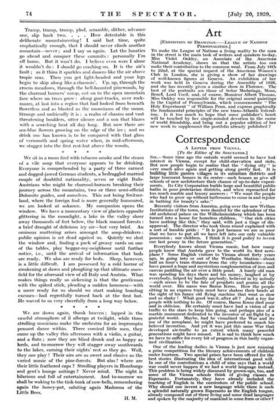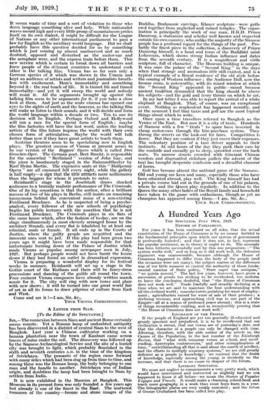Correspondence
A LETTER PROM VIENNA A.
[To the Editor of the SPECTATOR.] SIR,—Some time ago the outside world seemed to have lost interest in Vienna, except for child-starvation and riots. But now people begin to realize that the " dying city " is very much alive again and getting along pretty fast. It is building little garden villages in its suburban districts and large tenement houses in its centre—such houses as give all schools of new architecture their chance of up-to-date experi- ments. Its City Corporation builds large and beautiful public baths in poor proletarian districts, and when reproached for too much marble and luxury answers : " We want the people who had to grow up without bathrooms to come in and rejoice in bathing for beauty's sake."
Recently visitors from America, going over the new Welfare Institutions of the town, were dazzled by the splendour of the old arehducal palace on the Wilhelminenberg which has been turned into a home for homeless children. Our rich cities have nothing like this," they said, with just a tinge of dis- approval. The director who took them round explained with a sort of humble pride : " It is just because we are so poor that we have to put all we have left into our only valuable possession ; our children. I think it is good policy to invest our last penny in the future generation. '
Everybody knows about Vienna music, but how many
people know that Austria gave to the world its first aero- plane ? Some English visitors to Vienna about forty years ago, in going into or out of the Westbahn Station—about half an hour's train distance from the city boundaries—may have passed a huge and mysterious conglomeration of iron and canvas paddling the air over a little pond. A lonely old man was spending his days there and his money, laughed at by everybody, helped by hardly anybody, believed in by -nobody —such seems to be the fate of prophets and genius all the world over. His name was Baron Kress. How the people sitting in an express train must have shaken their heads at the sight of his funny old flying machine that went so slow and so shaky ! What good was it, after all ? Just a toy for people with nothing to do. Of course, Baron Kress died poor and in oblivion. He certainly must have had a vision of air traffic to the stars to keep him going, and perhaps also of a marble monument dedicated to the inventor of air flight by a grateful world. Maybe, had he visualized the War and its use of the aeroplane, he might have preferred to smash his beloved invention. And yet it was just this same War that developed air-traffic to an extent which many peaceful generations might have missed. It is sad to think how much we have to suffer for every bit of progress in this badly organ- ized civilization
One of the leading dailies in Vienna is just now running
a prize competition for the literary achievements of children under fourteen. Two special prizes have been offered -for the best stories illustrating the idea of international good will. In one of the contributions a child of nine says that a world war could never happen if we had a world language instead. This problem- is being widely discussed by grown-ups, too, and some of the Vienna schools think of giving classes in Esperanto. Fortunately, they have already included the teaching of English in the curriculum of the public school. Why should one invent a new language while there is such a splendid naturally grown Esperanto as the English tongue, already composed out of three living and some dead languages and spoken by the majority of mankind in some form or other? It seems waste of time and a sort of violation to those who deem language something alive and holy. While nationalist waves mount high and every little group of mountaineers prides itself on its own dialect, it might be difficult for the League of Nations or any other international parliament to pass a law for English as the auxiliary world language. But we shall probably have this question decided for us by something which is just corning up almost unobserved and as much doubted, opposed and disturbed as the motor-car and the aeroplane were, and the express train before them. This new service which is certain to break down all barriers and force people of the different countries to understand each other is the talking film. Vienna has so far seen only a German species of it which was shown in the Urania and kept an audience of artists and writers and journalists breath- less with excitement. Here's immortality and something beyond it : the real touch of life. It is tinned life and tinned immortality and yet it will sweep the world and nobody will resist it. All the arguments brought up against the talking film seem to be arguments for it, if you take a close look at them. And just as the mute cinema has opened our eyes to the sights of earth and the heavens, so the talking film will make us listen to their sounds, and it will decide and form the world language within a decade or two. Ten to one its decision will be. English. Perhaps Oxford and Hollywood will run a race for the special form of English • maybe the film factories will have the last word, unless the leading artists of the film future impress the world with their own chosen form of articulation. Maybe the world will talk better than now if they have great artists to teach them.
Austrian theatres seem to be specializing now in English plays. The greatest success of Vienna at present seems to be our version of the Beggars' Opera which is called Drei Oroschen-Open. The German poet, Bert Brecht, is responsible for the somewhat " Berlinized version of John Gay, and the piece is handsomely staged in the Raimundtheater by Karl Heinz Martin. The expensive seats at this " Halfpenny Opera " are all crammed full every night, while the gallery is half empty—a sign that the title attracts more millionaires than the beggars for whom it pretends to cater. Reinhardt's stage in the Josefstadt draws shocked audiences to a brutally realistic performance of The Criminals. One of its big sensations is that the author, after a brilliant Success of two of his plays in Berlin, still insists on remaining imbnymous behind the convenient name of a non-existing Ferdinand Bruckner. As he is suspected of being a psycho- analyst, every follower of the new schools of psychology begins his public lectures with the assertion that he is not Ferdinand Bruckner. The Criminals plays in six flats of the same house which, after the fashion of to-day, are on the stage simultaneously (a most cleverly arranged house by the architect Strand), and every flat is inhabited by at least one criminal, male or female. It all ends up in the Courts of Justice, where the guilty people are acquitted and the innocent ones sent to jail. If this play had been given two years ago it might have been made responsible for that unfortunate burning down of the Palace of Justice which made Vienna so popular among newspaper men in July, -1927. But perhaps people would not have burnt the house down if they had found an outlet in dramatical expression.
Vienna is preparing a wonderful display for its festival weeks in summer. Reinhardt will set up a stage in the Gothic court of the Rathaus and there will be fancy-dress processions and dancing of the guilds all round the town. Four eminent Vienna composers have already written march music for it. The city will ring with new tunes and glare with new shows ; it will be turned into one great world fair of art in all its forms to draw pilgrims of culture from East and West.
Come and see it !—I am, Sir, &c., YOUR VIENNA CORRESPONDENT.

















































 Previous page
Previous page